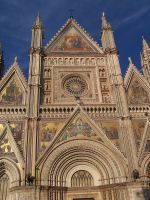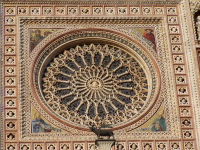The tufaceous cliff on which Orvieto stands offers extraordinary settlement opportunities. Naturally defended, it dominates the fertile Paglia valley and controls the communication axis formed by the Tiber, Paglia and Chiani valleys. Here the Etruscan city of Velzna arose, later known by the Roman name of Volsinii Veteres. Between the 9th and 8th centuries BC. the development of the Etruscan civilization began and between the 6th and 4th centuries BC. the city became extremely prosperous. Evidence of this is, among other things, the imports of Attic ceramics and a rich craftsmanship, which reaches the highest levels of quality in architectural terracottas.
In the territory of Volsini there was the sanctuary of the god Voltumna, the federal and religious center of the Etruscan cities, probably identifiable with the monument excavated in the nineteenth century south of Orvieto. After a long conflict, which began already in the 4th century BC, the Romans conquered the city in 264 BC, plundered it (the loot was 2,000 bronze statues!), the inhabitants were deported to the shores of Lake Bolsena, in a private location of natural defenses. The new city, the current Bolsena, was called Volsini Novi. The site of Orvieto, never completely abandoned, was reborn in the 6th century AD. with the significant name of Urbs Vetus: Old City, from which the current one derives.
The municipality was particularly prosperous between the end of the 12th and the beginning of the 13th century. After various events, including the repeated dominions of various local and foreign lords, it was permanently part of the Papal State from 1450 to Italian unification.
 Cathedral |  Rose-window of the Cathedral
|
If you go to visit Orvieto can also do a nice tour that winds along a path easily accessible, and disclose the basement of Orvieto, built by the ancient inhabitants in about 2500 years of continuous excavation. A journey of about an hour to discover surprising and unexpected "City Underground ".
[read more www.orvietounderground.it]

